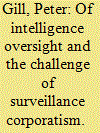| Srl | Item |
| 1 |
ID:
175090


|
|
|
|
|
| Summary/Abstract |
During the Iran-Iraq war there were extensive rumours in the press regarding Iran’s use of Iranian Military Procurement Offices (IMPOs) in London to purchase arms. This article seeks to interrogate the facts behind these rumours: what was going on inside the IMPOs? How much intelligence did the British government have about this? Not a huge amount – largely a result of the IMPOs being a challenging target and Britain’s intelligence priorities in London lying elsewhere. More broadly the paper seeks to provide insights into the challenges of gathering intelligence from – and responding to the activities of – foreign government targets on home turf, as well as providing insights into an under-considered area of intelligence – that surrounding embargoes and sanctions.
|
|
|
|
|
|
|
|
|
|
|
|
|
|
|
|
| 2 |
ID:
175088


|
|
|
|
|
| Summary/Abstract |
This article discusses counter-terrorism intelligence cooperation between Britain and its mainland partners. In contrast to disciplinary assumptions whereby Britain is loosely connected to Europe, it argues that British intelligence has a European connection. This is supported by extensive ethnographic fieldwork with British counter-terrorism police liaison officers deployed in France and a reading of intelligence cooperation from a sociological perspective. In mobilising a Bourdieusian approach that focuses on the study of social actors and their practices, the article shows how British intelligence is embedded in European intelligence cooperation as well as the increasing place of law enforcement in counter-terrorism intelligence.
|
|
|
|
|
|
|
|
|
|
|
|
|
|
|
|
| 3 |
ID:
175089


|
|
|
|
|
| Summary/Abstract |
The evaluation of the effectiveness of surveillance technology in intelligence agencies and oversight bodies is notably lacking. Assessments of surveillance technology concerning legal compliance, cost, and matters of privacy occupy a solid place, but effectiveness is rarely considered. Bureaucracy may explain this absence. Applying James Q. Wilson’s observations on bureaucracy reveals that effectiveness is minimally treated because it is more difficult to evaluate than budget assessments and legal compliance, and because intelligence outcomes are unobservable and difficult to oversee. Effectiveness evaluation is thus fettered by bureaucracy. Considerations of bringing in effectiveness assessment must appreciate the realities of bureaucratic constraints to be successful.
|
|
|
|
|
|
|
|
|
|
|
|
|
|
|
|
| 4 |
ID:
175084


|
|
|
|
|
| Summary/Abstract |
The partial release of Canadian intelligence assessments on Iraq during 2002 and 2003 has made it possible for the first time to examine the role that intelligence played in informing the Chrétien government’s decisions in the lead-up to the war in Iraq. Canadian assessments of US policy on Iraq, Baghdad’s weapons of mass destruction capabilities, the regional implications of an invasion, and the subsequent internal instability of Iraq proved to be largely accurate, in contrast to much of the analysis on Iraq by other members of the Five Eyes intelligence partnership.
|
|
|
|
|
|
|
|
|
|
|
|
|
|
|
|
| 5 |
ID:
175086


|
|
|
|
|
| Summary/Abstract |
This article examines the experience of oversight during the last fifty years in order to inform current debates in both the older and newer democracies. First, there is a discussion of certain key concepts: intelligence governance including control, authorisation and oversight; second, the difficulties facing oversight, specifically, how these can be alleviated by a structure involving both parliamentary and specialist bodies and, third, the challenges presented by the structures of surveillance corporatism and its reliance on bulk collection. It is concluded that this new intelligence architecture requires a form of decentred regulation of and by state and corporate actors.
|
|
|
|
|
|
|
|
|
|
|
|
|
|
|
|
| 6 |
ID:
175085


|
|
|
|
|
| Summary/Abstract |
Canada established independent signals intelligence in 1946, after years of British and American guidance. The dominant driver was inclusion in postwar intelligence sharing. Wartime intelligence negotiations depict Canadians framing themselves relative to their allies, seeking to shake off a ‘younger brother’ mindset and to migrate from British-led models towards autonomous intelligence sharing with the Americans. This paper traces the origins of autonomous Canadian signals intelligence in the context of postwar intelligence sharing with the United States and United Kingdom, demonstrating Canada’s prioritization of capabilities that would ensure inclusion in the intelligence-sharing partnership known today as Five Eyes.
|
|
|
|
|
|
|
|
|
|
|
|
|
|
|
|
| 7 |
ID:
175087


|
|
|
|
|
| Summary/Abstract |
The National Security Council was created to bring together decision makers and experts to discuss and implement the UK’s National Security Strategy. Its creation may have decreased the likelihood of some types of intelligence failures by policy makers, for example misunderstanding the nature and limitations of intelligence, but there is conflicting evidence regarding whether it has mitigated the risk of others, like groupthink bias. Moreover, the NSC is neither a statutory institution nor is its use by members of the executive obligatory or prescribed. Therefore, its effectiveness continues to be subject to the whim of the prime minister of the day.
|
|
|
|
|
|
|
|
|
|
|
|
|
|
|
|